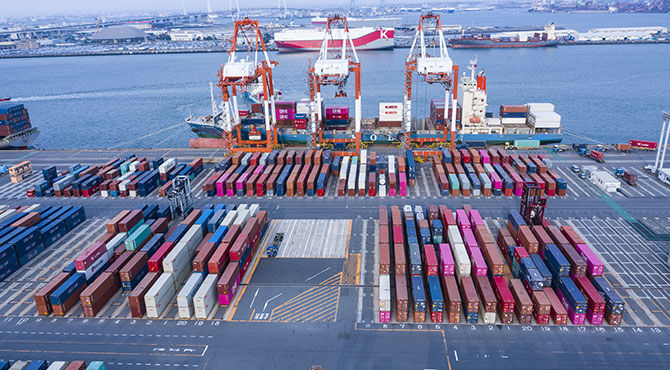Up to 10 free ports to be created in the UK
A respected think tank casts doubt on the benefits the UK government projects would result from creating 10 free ports after Brexit, while International Trade Secretary Liz Truss claims the plan would create "thousands of jobs".

 2 August 2019
2 August 2019How many jobs would this create, according to the UK government?
International Trade Secretary Liz Truss claimed during a visit to Teeside on Friday that the plan would create "thousands of jobs" and was an integral part of the government's post-Brexit trade plans.She said the government planned to create "the world's most advanced free port model" as soon as possible. She added, "We will have a truly independent trade policy after we leave the EU on October 31."What is a free port?
The government has announced the creation of a Freeports Advisory Panel, whose membership includes tax and technology experts, who will help set up the zones from bids submitted by ports and airports around the country.The zones will enable goods to be imported free of customs duties and be held or processed before being re-exported. Free ports can also be used to import raw materials and make finished goods for export.About 135 countries, predominantly in the Far East, have free trade zones. There are about 250 in the US and 80 in the European Union, primarily in nations that joined the bloc after 2004.Teeside and the Port of Tyne in northeast England, Milford Haven in Wales and London Gateway are among areas that have so far expressed an interest in becoming freeports, the government said.Prime Minister Boris Johnson said in a speech that free ports would provide thousands of jobs for people in "left-behind areas".The new Brexit-supporting Chief Secretary to the Treasury Rishi Sunak said in a statement on Friday, "We are exploring free ports as an innovative way to drive growth and support thousands of high-skilled jobs across the UK."We will focus on those areas that could benefit the most, as we look to boost investment and opportunity for communities across the country."Research last year by consultancy and construction firm Mace suggested that creating seven freeports in the north of England could create 150,000 jobs and add £9 billion a year to the UK's gross domestic product.However, experts cast doubts on UK government figures and projections
However, the UK Trade Policy Observatory, run by the University of Sussex and Chatham House think-tank, has cast doubt on these figures, saying much of free port activity would be as a result of redistributing economic activity from elsewhere in the country.Barry Gardiner, the Labour Party's shadow international trade secretary, said, "Freeports and free enterprise zones risk companies shutting up shop in one part of the country in order to exploit tax breaks elsewhere and, worst of all, lower employment rights."The British people did not vote for this new administration and they certainly did not vote to see their jobs and livelihoods threatened in favour of gifting further tax breaks to big companies and their bosses."Read the latest news and analysis on Brexit in our special Brexit section.
Subscribe to Relocate Extra, our monthly newsletter, to get all the latest international assignments and global mobility news.Relocate’s new Global Mobility Toolkit provides free information, practical advice and support for HR, global mobility managers and global teams operating overseas.
 Access hundreds of global services and suppliers in our Online Directory
Access hundreds of global services and suppliers in our Online Directory
©2024 Re:locate magazine, published by Profile Locations, Spray Hill, Hastings Road, Lamberhurst, Kent TN3 8JB. All rights reserved. This publication (or any part thereof) may not be reproduced in any form without the prior written permission of Profile Locations. Profile Locations accepts no liability for the accuracy of the contents or any opinions expressed herein.





























